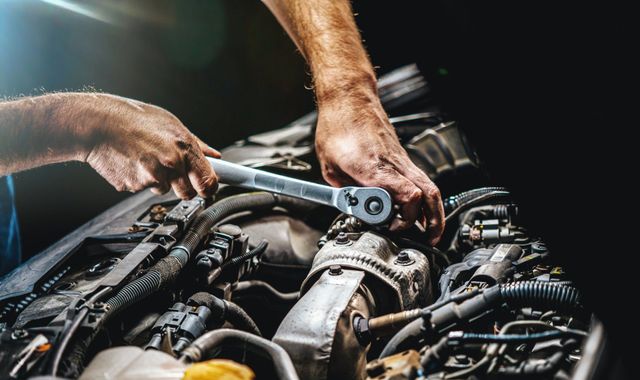All Categories
Featured
The timing belt is an important part of your engine, in charge of integrating the movement of numerous engine components, such as the crankshaft and camshaft. This makes sure the engine's shutoffs close and open at the correct times throughout the combustion cycle. While the timing belt might not be something you consider frequently, disregarding its upkeep can lead to considerable engine damage and expensive repair services. Below's why timing belt replacement is important for your automobile's durability and efficiency.
What Is a Timing Belt and Exactly How Does It Work? The timing belt is a rubber or composite product belt that connects the crankshaft to the camshaft in an inner burning engine. The camshaft manages the opening and closing of the engine's consumption and exhaust shutoffs, and it must be timed completely with the movement of the pistons in the engine. The timing belt makes certain that these elements remain in sync, permitting the engine to run efficiently.
If the timing belt comes to be or stops working worn, the camshaft and crankshaft will certainly no more be integrated, which can create the engine's shutoffs to hit the pistons. This brings about catastrophic engine damages and usually needs costly repair work or also an engine substitute.
Why Is Timing Belt Replacement Important? Gradually, the timing belt can put on down as a result of rubbing, warm, and basic engine wear. While it might appear like a little concern, a damaged timing belt can lead to severe engine issues. Below's why prompt replacement is crucial:
Avoiding Engine Damage: As mentioned, a damaged or slipping timing belt can trigger the engine's pistons and valves to collide. This causes curved valves, damaged pistons, and in serious cases, a full engine failure. Changing the timing belt prior to it damages can avoid this pricey damages.
Maintaining Engine Effectiveness: A damaged timing belt can interrupt the synchronization of the engine components, decreasing overall engine performance. Replacing the belt aids maintain optimum engine function, making sure smooth procedure, improved fuel efficiency, and far better performance.
Preventing Unforeseen Malfunction: A damaged timing belt can leave you stranded on the side of the roadway, causing a major hassle. By replacing the timing belt at the recommended periods, you can avoid the threat of an unanticipated malfunction, especially in the middle of a long journey or when you the very least anticipate it.
![]()
Conserving Money over time: While timing belt replacement can appear like an expenditure you could intend to place off, it's more affordable than the cost of repairing or changing a damaged engine. The substitute expense is fairly cost effective compared to the extensive repair services called for if the timing belt breaks. Positive maintenance can save you hundreds of bucks out of commission and preserve your vehicle's worth.
When Should You Replace the Timing Belt? The timing belt replacement schedule can vary depending upon your automobile's make and model. As a whole, the majority of suppliers advise replacing the timing belt every 60,000 to 100,000 miles. It's constantly best to consult your proprietor's handbook or a trusted technician for certain suggestions for your automobile.
Indicators that your timing belt may be in demand of replacement consist of unusual engine sounds such as whining or ticking, difficulty beginning the engine, or an obvious decrease in engine efficiency. If you experience any of these signs, it is necessary to have the timing belt checked right away.
![]()
Final thought. Changing the timing belt at the suggested periods is an essential component of keeping your engine's wellness and making certain that your car runs efficiently. A broken timing belt can bring about pricey repair services, engine failure, and unanticipated malfunctions, which can be stayed clear of with appropriate maintenance. Constantly comply with the supplier's recommended timing belt replacement routine and seek advice from a specialist technician if you notice any signs of wear or damage. By keeping this important component of your engine in excellent problem, you'll secure your vehicle from costly repairs and take pleasure in many even more miles of carefree driving.
What Is a Timing Belt and Exactly How Does It Work? The timing belt is a rubber or composite product belt that connects the crankshaft to the camshaft in an inner burning engine. The camshaft manages the opening and closing of the engine's consumption and exhaust shutoffs, and it must be timed completely with the movement of the pistons in the engine. The timing belt makes certain that these elements remain in sync, permitting the engine to run efficiently.
If the timing belt comes to be or stops working worn, the camshaft and crankshaft will certainly no more be integrated, which can create the engine's shutoffs to hit the pistons. This brings about catastrophic engine damages and usually needs costly repair work or also an engine substitute.
Why Is Timing Belt Replacement Important? Gradually, the timing belt can put on down as a result of rubbing, warm, and basic engine wear. While it might appear like a little concern, a damaged timing belt can lead to severe engine issues. Below's why prompt replacement is crucial:
Avoiding Engine Damage: As mentioned, a damaged or slipping timing belt can trigger the engine's pistons and valves to collide. This causes curved valves, damaged pistons, and in serious cases, a full engine failure. Changing the timing belt prior to it damages can avoid this pricey damages.
Maintaining Engine Effectiveness: A damaged timing belt can interrupt the synchronization of the engine components, decreasing overall engine performance. Replacing the belt aids maintain optimum engine function, making sure smooth procedure, improved fuel efficiency, and far better performance.
Preventing Unforeseen Malfunction: A damaged timing belt can leave you stranded on the side of the roadway, causing a major hassle. By replacing the timing belt at the recommended periods, you can avoid the threat of an unanticipated malfunction, especially in the middle of a long journey or when you the very least anticipate it.

Conserving Money over time: While timing belt replacement can appear like an expenditure you could intend to place off, it's more affordable than the cost of repairing or changing a damaged engine. The substitute expense is fairly cost effective compared to the extensive repair services called for if the timing belt breaks. Positive maintenance can save you hundreds of bucks out of commission and preserve your vehicle's worth.
When Should You Replace the Timing Belt? The timing belt replacement schedule can vary depending upon your automobile's make and model. As a whole, the majority of suppliers advise replacing the timing belt every 60,000 to 100,000 miles. It's constantly best to consult your proprietor's handbook or a trusted technician for certain suggestions for your automobile.
Indicators that your timing belt may be in demand of replacement consist of unusual engine sounds such as whining or ticking, difficulty beginning the engine, or an obvious decrease in engine efficiency. If you experience any of these signs, it is necessary to have the timing belt checked right away.

Final thought. Changing the timing belt at the suggested periods is an essential component of keeping your engine's wellness and making certain that your car runs efficiently. A broken timing belt can bring about pricey repair services, engine failure, and unanticipated malfunctions, which can be stayed clear of with appropriate maintenance. Constantly comply with the supplier's recommended timing belt replacement routine and seek advice from a specialist technician if you notice any signs of wear or damage. By keeping this important component of your engine in excellent problem, you'll secure your vehicle from costly repairs and take pleasure in many even more miles of carefree driving.
Latest Posts
Wonderful Treats & Smooth Feelings at Shake Street
Published Apr 19, 25
2 min read
Trusted Auto Care for All Cars & Trucks: Your Premier Auto Service in Montclare
Published Apr 19, 25
2 min read
Preventative Maintenance at Montclare Auto Repair: Protect Your Vehicle Operating Like New
Published Apr 19, 25
2 min read
More
Latest Posts
Wonderful Treats & Smooth Feelings at Shake Street
Published Apr 19, 25
2 min read
Trusted Auto Care for All Cars & Trucks: Your Premier Auto Service in Montclare
Published Apr 19, 25
2 min read
Preventative Maintenance at Montclare Auto Repair: Protect Your Vehicle Operating Like New
Published Apr 19, 25
2 min read